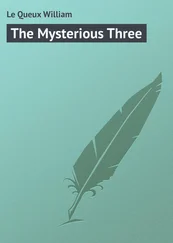William Le Queux - As We Forgive Them
Здесь есть возможность читать онлайн «William Le Queux - As We Forgive Them» — ознакомительный отрывок электронной книги совершенно бесплатно, а после прочтения отрывка купить полную версию. В некоторых случаях можно слушать аудио, скачать через торрент в формате fb2 и присутствует краткое содержание. Жанр: foreign_prose, на английском языке. Описание произведения, (предисловие) а так же отзывы посетителей доступны на портале библиотеки ЛибКат.
- Название:As We Forgive Them
- Автор:
- Жанр:
- Год:неизвестен
- ISBN:нет данных
- Рейтинг книги:3 / 5. Голосов: 1
-
Избранное:Добавить в избранное
- Отзывы:
-
Ваша оценка:
- 60
- 1
- 2
- 3
- 4
- 5
As We Forgive Them: краткое содержание, описание и аннотация
Предлагаем к чтению аннотацию, описание, краткое содержание или предисловие (зависит от того, что написал сам автор книги «As We Forgive Them»). Если вы не нашли необходимую информацию о книге — напишите в комментариях, мы постараемся отыскать её.
As We Forgive Them — читать онлайн ознакомительный отрывок
Ниже представлен текст книги, разбитый по страницам. Система сохранения места последней прочитанной страницы, позволяет с удобством читать онлайн бесплатно книгу «As We Forgive Them», без необходимости каждый раз заново искать на чём Вы остановились. Поставьте закладку, и сможете в любой момент перейти на страницу, на которой закончили чтение.
Интервал:
Закладка:
“But he may be young and good-looking, the veritable Paolo of romance – and you his Francesca,” I suggested, smiling.
Her sweet lips relaxed slightly, but she shook her head, sighing as she answered —
“Please don’t anticipate anything of the kind. I only hope he may be old and very ugly.”
“So that he will not arouse my jealousy – eh?” I laughed. “Really, Mabel, if our friendship were not upon such a well-defined basis, I should allow myself to act the part of lover. You know I – ”
“Now don’t be foolish,” she interrupted, raising her small finger in mock reproval. “Remember what you said yesterday.”
“I said what I meant.”
“And so did I. To tell you the truth, I like to think of you as my big brother,” she declared. “I suppose I shall never love,” she added, reflectively, gazing into the blazing fire.
“No, no; don’t say that, Mabel. You’ll one day meet some man in your own station, love him, marry and be happy,” I said, my hand upon her shoulder. “Recollect that with your wealth you can secure the pick of the matrimonial market.”
“Some impoverished young aristocrat, you mean? No, thanks. I’ve already met a good many, but their disguise of affection has always been much too thin. Most of them wanted my money to pay off mortgages on their estates. No, I’d much prefer a poor man – although I shall never marry – never.”
I was silent for a moment, then I remarked quite bluntly —
“I always thought you would marry young Lord Newborough. You both seemed very good friends.”
“So we were – until he proposed to me.”
And she looked me straight in the face with that clear gaze and those splendid eyes wide open in wonderment, almost like a child’s.
Her character was a strangely complex one. As a tall, willowy girl, in those early days of our acquaintance, I knew her to be high-minded and wilful, yet of that sweet affectionate disposition that endeared her to every one with whom she came into contact. Her nature was so calm and so sweet that in her love seemed an unconscious impulse. I had often thought she was surely too soft, too good, too fair to be cast among the briers of the world, and fall and bleed upon the thorns of life. The world is just as cold and pitiless and just as full of pitfalls for the young and unwary in Mayfair as in Mile End. Hence, to fulfil my promise to that man now silent in his grave, it was my duty to protect her from the thousand and one wiles of those who would endeavour to profit by sex and inexperience.
Her early privations, her hard life in youth while her father was absent at sea, and those weary months of tramping the turnpikes of England, all had had their effect upon her. With her, love seemed to be scarcely a passion or a sentiment, but a dreamy enchantment, a reverie which a fairy spell dissolved or riveted at pleasure. So exquisitely delicate was her character, just as was her countenance, that it seemed as if a touch would profane it. Like a strain of sad, sweet music which comes floating by on the wings of night and silence, and which we rather feel than hear, like the exhalation of the violet dying even upon the sense it charms, like the snow-flake dissolved in air before it has caught a stain of earth, like the light surf severed from the billow which a breath disperses – such was her nature, so full of that modesty, grace and tenderness without which a woman is no woman.
As she stood there before me, a frail, delicate figure in her plain black gown, and her hand in mine, thanking me for the investigation which I was undertaking in her behalf, and wishing me bon voyage , I shuddered to think of her thrown alone amid harsh and adverse destinies, and amid all the corruptions and sharks of society, perhaps without energy to resist, or will to act, or strength to endure. Alone in such a case, the end must inevitably be desolation.
I wished her farewell, turning from her with a feeling that, loving her as I admit I did, I was nevertheless unworthy of her. Yet surely I was playing a dangerous game!
I had entertained a strong and increasing affection for her ever since that winter’s night down at Helpstone. Still, now that she was possessor of vast wealth, I felt that the difference in our ages and the fact that I was a poor man were both barriers to our marriage. Indeed, she had never exerted any of the feminine wiles of flirtation towards me; she had never once allowed me to think that I had captivated her. She had spoken the truth. She regarded me as an elder brother – that was all.
That same night, as I paced the deck of the Channel steamer in the teeth of a wintry gale, watching the revolving light of Calais harbour growing more and more distinct, my thoughts were full of her. Love is the teacher, grief the tamer, and time the healer of the human heart. While the engines throbbed, the wind howled and the dark seas swirled past, I paced up and down puzzling over the playing-card in my pocket and reflecting upon all that had occurred. The rich fancies of unbowed youth, the visions of long-perished hopes, the shadows of unborn joys, the gay colourings of the dawn of existence – what ever my memory had treasured up, came before me in review, but lived no longer within my heart.
I recollected that truism of Rochefoucauld’s: “Il est difficile de definer l’amour: ce qu’on en peut dire est que, dans l’ame, c’est un passion de regner; dans les esprits, c’est une sympathie; et dans le corps, ce n’est qu’une envie cachée et delicate de posséder ce que l’on aime, après beaucoup de mystères.” Yes, I loved her with all my heart, with all my soul, but to me I recognised that it was not permitted. My duty, the duty I had promised to fulfil to that dying man whose life-story had been a secret romance, was to act as Mabel’s protector, and not to become her lover and thus profit by her wealth. Blair had left his secret to me, in order, no doubt, to place me beyond the necessity of fortune-hunting, and as it had been lost it was my duty to him and to myself to spare no effort to recover it.
With these sentiments firmly established within my heart I entered the wagon-lit at Calais, and started on the first stage of my journey across Europe from the Channel to the Mediterranean.
Three days later I was strolling up the Via Tornabuoni, in Florence, that thoroughfare of mediaeval palaces, banks, consulates and chemists’ shops that had been so familiar to me each winter, until I had taken to hunting in England in preference to the sunshine of the Lung’ Arno and the Cascine. Indeed, some of my early years had been spent in Italy, and I had grown to love it, as every Englishman does. In that bright February morning as I passed up the long, crooked street, filled by the nonchalant Florentines and the wealthy foreigners out for an airing, I passed many men and women of my acquaintance. Doney’s and Giacosa’s, the favourite lounges of the men, were agog with rich idlers sipping cocktails or that seductive petit verre known in the Via Tornabuoni as a piccolo , the baskets of the flower-sellers gave a welcome touch of colour to the grim grey of the colossal Palace of the Strozzi, while from the consulates the flags of various nations, most conspicuous of all being that of the ever-popular “Major,” reminded me that it was the festà of Santa Margherita.
In the old days, when I used to live en pension with a couple of Italian artillery officers and a Dutch art-student in the top floor of one of those great old palaces in the Via dei Banchi, the Via Tornabuoni used to be my morning walk, for there one meets everybody, the ladies shopping or going to the libraries, and the men gossiping on the kerb – a habit quickly acquired by every Englishman who takes up his abode in Italy.
Читать дальшеИнтервал:
Закладка:
Похожие книги на «As We Forgive Them»
Представляем Вашему вниманию похожие книги на «As We Forgive Them» списком для выбора. Мы отобрали схожую по названию и смыслу литературу в надежде предоставить читателям больше вариантов отыскать новые, интересные, ещё непрочитанные произведения.
Обсуждение, отзывы о книге «As We Forgive Them» и просто собственные мнения читателей. Оставьте ваши комментарии, напишите, что Вы думаете о произведении, его смысле или главных героях. Укажите что конкретно понравилось, а что нет, и почему Вы так считаете.












